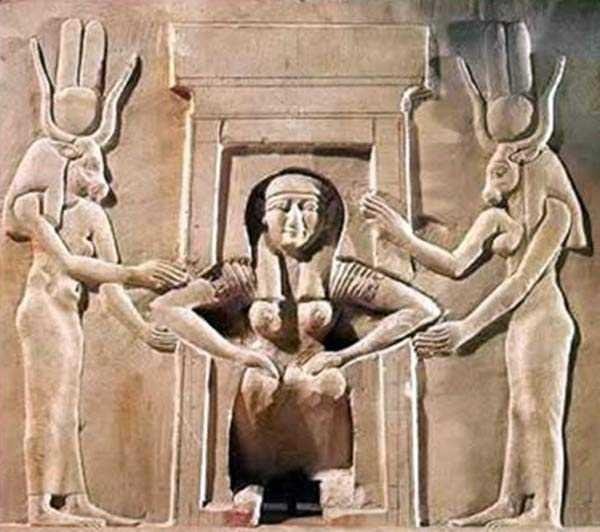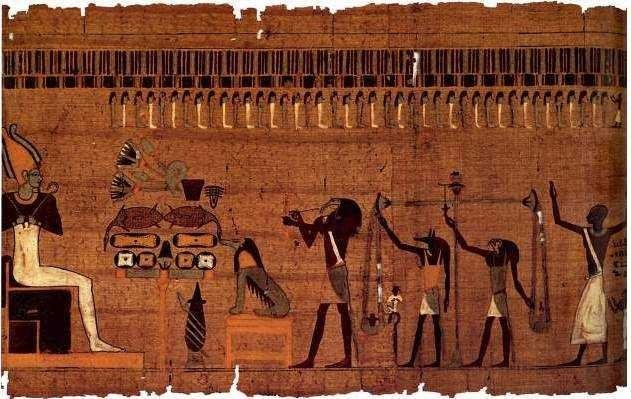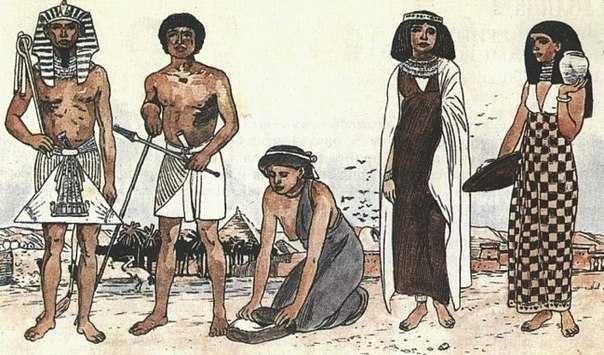The Status of Women and Childbirth in Ancient Egypt
Many women consult with doctors about infertility, and the medical literature provides instructions on how to determine the possibility of conception. "To ascertain whether a woman can have a child, roll the" bededuka "grass in the powder and soak in the milk of a woman who has a son.Let the patient eat it, if it vomits, then the child will bear, if it has a gas herd, it will not hold" ...
If Isida (ed.) Is actually pregnant, she would rather switch to a midwife than a doctor to help give birth. When his birth was not smooth, the midwife came to the mother's house with a wooden maternity chair with a semicircular seat and two vertical bars, where the woman could gain support when she tried to push the child out. In the case of prolonged births, midwives may use a stimulant, either injected into the uterine cavity, or prepared as a heart-stimulating drink.

According to one medical papyrus, ingredients that can be used in such situations include salt, honey, oil, wine, incense, various herbs and vegetables, sometimes mixed with tortoiseshell or scarab beetle. Even with the help of such professionals, the birth is dangerous, both for mother and child. Contemporary researchers estimate that in Ancient Egypt, about 25 women of 1,000 died at birth or shortly thereafter, almost identical to those in rural England in the 16th - 18th centuries. e.
In the face of such dangers, Isis and his contemporaries tend to pray to one of the gods to increase their chances of survival, to help deliver. For example, the goddess Hathor, worshiped as a special protector and defender of women; Goddess Tautt in the form of hippopotamus or demons, the divinity of the house, whose ugliness is regarded as a good barrier to evil spirits. Other forms of magic also help: one papyrus offers relief from severe pain in combat:
those close to the woman should have spelled a certain mantra on a clay statue, and then put it on the forehead of a woman during childbirth. Archaeological evidence can not say whether Isis is happy in marriage, but if not, divorce for Egyptian women at that time is possible. They have the same rights as their husbands, to end an unsuccessful marriage. Part of the joint treasure and the dowry brought by the woman depends on who from her partner is the initiator of the divorce.
In other cases, women are also fully equal to men in the face of the law. Many preserved legal documents prove that they have the right to own property (land, indeed, transferred through women's channels), to dispose of it: rent, sell, perform other operations without the need for intermediaries and guardians to act on their behalf. One papyrus even recorded cases of land sales by a group of landowning women acting together. Likewise, the lawsuit between Irinofret and his neighbor as a slave shows that property and litigation are a matter for two women, their husbands are just witnesses and not taking personal responsibility. Women can adopt the children themselves, sign legal documents and become executors.

However, even for women of the wealthiest and strongest families, abstract equations do not guarantee an equal position. Egyptian literature speaks of sufficient duality in relation to women, and sometimes from clear hatred. In mythology, the great goddesses are in danger together with virtue: Hathor defends, but also fears with his terrible anger, and Isis at the same time is the mother goddess of breastfeeding, and a powerful evil wizard.
In a more secular story, the female character is usually a traitor who seduces, betrays and kills to satisfy their unclean passions. the popular literary genre called the "Teachers" of their authors passed the unwritten rules of behavior and morality from one generation to another, using conditional forms from his father's teachings for his son. In these texts (some of which date back to the era of the Old Kingdom, some 1000 years before Ramses's reign) were wary of women, especially when they were not under male authority. "Do not follow women," one of the authors prescribes. "Do not let him steal your heart, beware of strangers, do not look at him, when he passes, do not know him physically." Such creations, as the author tells us, are "inner rivers, which are currently unknown. husband.When there is no witness, ready to trap you. "
Guaranteed to be confined in marriage and motherhood, female sex becomes more worthy of respect. "Do not rule your wife in your home," says one writer, "when you know he's smart." But whatever pleasure in marriage happiness, a man should not forget his mother. "Master it, because it contains you." You are a heavy burden for him. But he did not leave you. "A woman's social position is determined by the position of her husband.In particular, in a text from the New Kingdom era, a principle is formulated that is still being observed today, more than 3,000 years later." A woman was asked about her husband, a man asked about her office. "

In the family funeral dome and tombstone the same rules were observed. The man - the head of the family, always considered the owner of the tomb, his name is immortalized by the inscription: his life history, the list of posts: which he occupied, and the highest achievement of his career. Information about wife and daughter is shorter. In addition to reporting their relationship with the owner of the tomb, they are given, at most, only very brief characteristics, such as "Mistress" or "The Songwoman" in the temple of some gods. When describing a couple sitting or worshiping a god, a man is almost always on the right, according to the canon of ancient Egyptian art, the main side of the image. Taking note of these differences, some modern Egyptian scholars warn against the assumption that Ancient Egypt was something of a feminist paradise. They show that all the information and all the pictures.
Only in rare cases, in the words and images that survive from the time of Ramses, is the voice of the women themselves who are heard. There was a letter to the papyrus from a woman named Hennutawi to her husband-the author. In his absence, he took over his responsibility for the distribution of wheat among the townspeople and found a discrepancy in the unit of measure employed by workers. "I went there on my own and told me to take the wheat while I was there, the amount reached 146.75 har (hara, that is," bag "in Ancient Egypt's Old and Middle Kingdom, the size of granular substrate volume, 1 har about 48 liters. New Kingdom, about 77 liters) were measured in Oyip. "People prove their innocence, assuring him that the whole grain is 150 hars, when it is weighed on the oipe steps in the barn. «I checked the size and told them:" I'm satisfied with the verification I'll find the grain, wherever it is "so I tell them." And the whole tone of his letter indicates that he really intends to do it. from this very straightforward letter, Hennutavi wrote: "Now do not worry about your father. I heard that he felt very good. "And still amusing him, he added:" The temple administrator Amun wrote to me: "Do not worry about him, he's fine, he's healthy. Nothing happens to him."
Unfortunately, women's letters, like Henuttawi's letters, are rare. But still, even if they were silent, the Egyptians could influence the course of history. One of the successors and the most famous name of Ramesses convinced of this by his own example, when the secret conspiracy among the younger wives, dissatisfied with their position, was ripe in the harem. He sowed the seeds of destruction and brought the dynasties closer.
